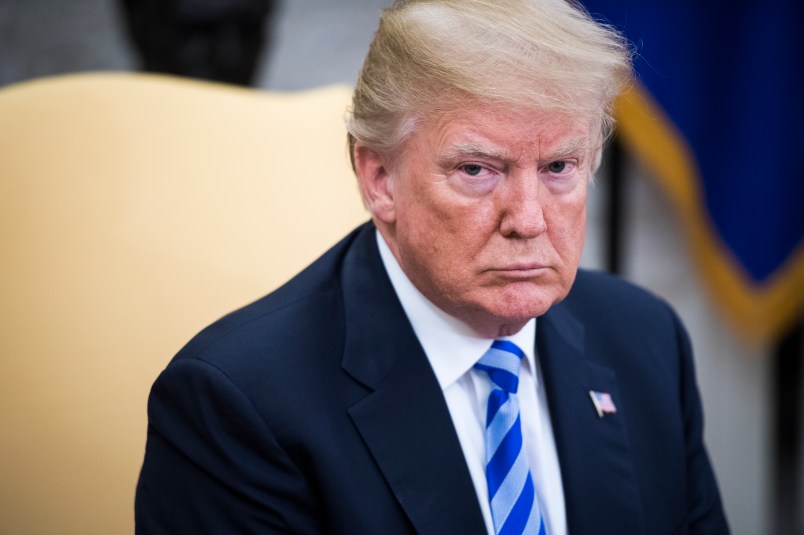If there’s a dark conspiracy theory circulating about Deep State efforts to undermine Donald Trump, it’s a safe bet that it started with Rep. Devin Nunes, the chair of the House Intelligence Committee.
That seems to be the case with the purported scandal du jour: that the FBI planted an informant in the Trump campaign in order to gain information about its possible ties to Russia. Such a move, Trump allies argue, would render the Mueller investigation into Russia’s 2016 election interference illegitimate.
The source met with three different Trump campaign officials, the Washington Post reported Friday evening. And the source’s name began circulating late last week in right-wing media. Still the nature of the intelligence the source provided, and exactly what prompted the FBI to seek to obtain intel from this person remain unclear.
As with previous Nunes-driven controversies, this one started weeks ago with the California Republican’s efforts to disclose classified intelligence information, festered in the media fever swamps, and then percolated up to the president, who on Friday said it may be the “all time biggest political scandal!”
Trump remained focused on the issue over the weekend, and on Sunday, in an extraordinary tweet, pledged to “demand” a DOJ investigation into whether the Obama administration was behind this supposed politically-motivated spying.
I hereby demand, and will do so officially tomorrow, that the Department of Justice look into whether or not the FBI/DOJ infiltrated or surveilled the Trump Campaign for Political Purposes – and if any such demands or requests were made by people within the Obama Administration!
— Donald J. Trump (@realDonaldTrump) May 20, 2018
It’s a good case study in how outlandish theories designed to discredit the Mueller investigation and bolster Trump’s position travel from the fringes to the White House. Here’s how we got here.
Since at least early April, Nunes has been demanding from the Justice Department un-redacted versions of the materials detailing the launch of the Russia probe. Slow-rolled by DOJ top brass, Nunes issued a subpoena in early May for all documents related to a person described by the Washington Post as a “sensitive, longtime intelligence source for the CIA and FBI.”
As a pair of Post articles, dated May 8 and 9, explained, the DOJ has refused to provide the documents, concerned that the safety of the U.S. citizen source could be endangered, and that ongoing intelligence investigations could be compromised.
DOJ and FBI officials ultimately agreed to hold an hour-long classified briefing with Nunes and House Oversight Committee Chairman Trey Gowdy on May 10, which appeared to quell the tensions somewhat.
The two GOP congressmen released a statement calling the meeting “productive” and expressing hope for a continued “dialogue” with the Justice Department.
But it was too late. That evening, the Wall Street Journal’s Kimberly Strassel published a column calling the DOJ’s reported concerns about the source’s safety a sign of “desperation” and interpreting the Post report to mean that the person was likely engaged in “outright spying” on, as well as trying to “infiltrate,” the Trump campaign.
Strassel’s claims were seized upon by Rush Limbaugh. It’s “a pretty safe bet that the FBI planted an informant in the Trump campaign,” Limbaugh said, in order to “catch and to discover and to witness Trump’s collusion with the Russians.”
Two days later, National Review’s Andrew McCarthy published a column noting that Fusion GPS founder Glenn Simpson testified that Christopher Steele, who Fusion had hired to look into the campaign’s ties to Russia, had told Simpson that the FBI had a “human source” in the Trump campaign. McCarthy speculated that the spy’s information was the real source of the U.S. Russia investigation.
The story broke wide open last week with the first mention of the word “informant” by a major mainstream publication. Buried in a lengthy Wednesday New York Times story on the origins of the Russia probe was this sentence: “At least one government informant met several times with Mr. [Carter] Page and Mr. Papadopoulos, current and former officials said.”
Breitbart jumped on the news with a headline about the FBI’s “spy operation” against the Trump campaign. Trump allies from Kellyanne Conway to Rudy Giuliani were soon sharing grave concerns about the presence of a spy in the campaign’s midst.
Any improper spying by such an informant would render the entire Mueller probe “completely illegitimate,” Giuliani told the Post on Thursday, before acknowledging to CNN Friday that they didn’t know “for sure” that such an individual even existed.
And Trump tweeted:
Wow, word seems to be coming out that the Obama FBI “SPIED ON THE TRUMP CAMPAIGN WITH AN EMBEDDED INFORMANT.” Andrew McCarthy says, “There’s probably no doubt that they had at least one confidential informant in the campaign.” If so, this is bigger than Watergate!
— Donald J. Trump (@realDonaldTrump) May 17, 2018
Of course, all of these interpretations rest on the notion that if the FBI surveilled the Trump campaign, it was motivated by political bias. None consider that these agencies could have been attempting the difficult task of investigating Russia’s meddling in the campaign on Trump’s behalf without improperly influencing the election by revealing the probe.
They also gloss over the fact that we’ve been down this road several times before. Nunes has been at war with the DOJ and FBI on Trump’s behalf for well over a year, trying to uncover evidence that will prove that Trump was unfairly targeted.
There was last spring’s botched effort to prove that Trump staffers’ identities were improperly revealed in transcripts of conversations swept up in foreign surveillance. National security experts and bipartisan lawmakers said that there was nothing out of the ordinary about the unmasking requests.
Then there was this February’s memo that was supposed to serve as definitive proof of anti-Trump bias among DOJ and FBI leadership and bring the Mueller probe to a screeching halt. It was a bust.
He may not have succeeded yet. But the new “spy” controversy suggests that Nunes’ efforts will continue.










